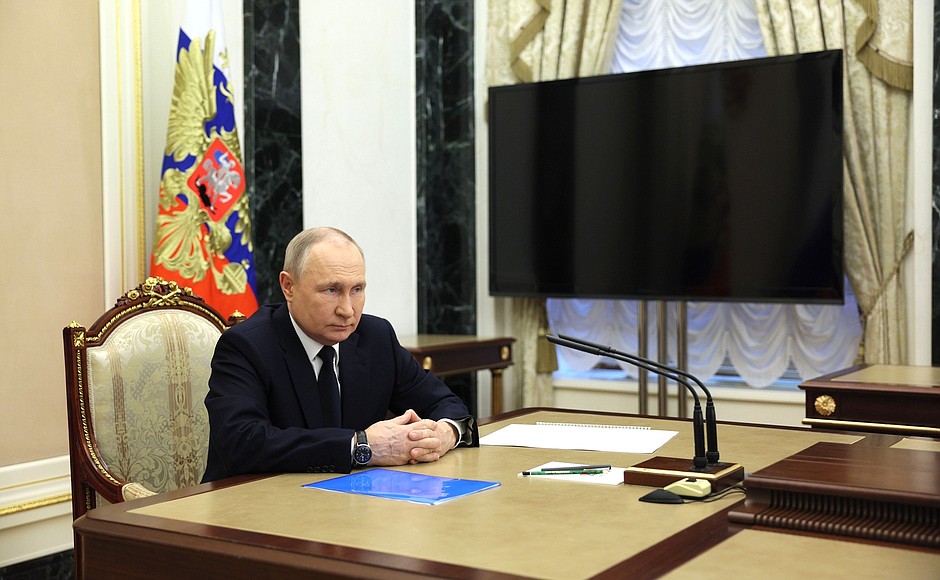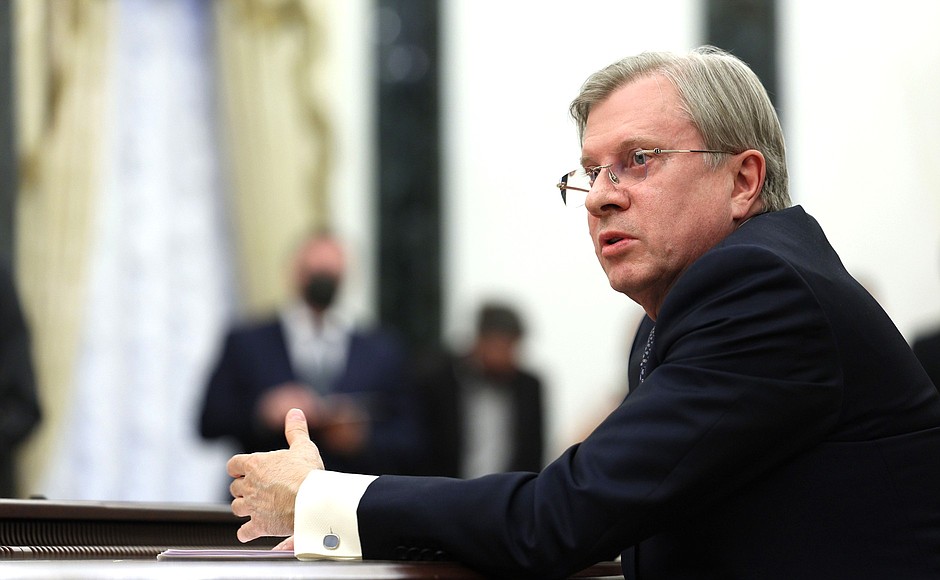President of Russia Vladimir Putin: Good afternoon, Mr Savelyev.
You and I wanted to discuss issues dealing with the upcoming operation of the transport complex during the summer holidays – the spring and summer season and into the first part of autumn.
Minister of Transport Vitaly Savelyev: Good afternoon Mr President.
You are right, the traditional season of summer holidays is coming, and the transport complex is carrying out its annual preparation of the transport infrastructure.
A few words about aviation transportation. This year, we are planning to transport, as you know, 101.2 million passengers. As of March, we have already transported 13.8 million passengers, which is already 416,000 passengers more than we accounted for in our plan for this year.
Russian airlines plan to extend their route network, which is very important for our passengers. For example, S7 Airlines is going to launch flights from Irkutsk to Chita and Novosibirsk to Vladikavkaz. Red Wings airlines will fly from Samara to Gorno-Altaysk, while Nordwind airlines will fly from Kazan to Gorno-Altaysk, and Makhachkala to Omsk. Aeroflot is going to delight their passengers with flights to Mineralnye Vody from Samara, Kazan, Perm, Yekaterinburg. and Ufa. Aeroflot group will also support Turkish destinations from Samara, Moscow, Nizhniy Novgorod, and other cities.
Railway transportation is also prepared for the summer season. Trains of the Federal Passenger Company plan to transport more than 11 million passengers via railway to Russia’s south, which is two percent more than last year. More than 13.4 million seats will be offered on the open market for the summer tourist seasons, which represents a two percent increase year on year.
As part of our organized tours for children, we aim to please our younger passengers and plan to transport more than 620,000 children, which is 50 percent more than last year.
The Grand Service Express is planning to provide services on 22 passenger trains destined for Crimea, to the Crimean Peninsula. This is practically 8 return trips more than last year’s standard, while last year there were 14 return trips. We are going to additionally engage more than 400 passenger cars.
Overall, we will ensure passenger transportation for three million passengers [in this direction] for the period from May 1 to September 30 this year. This will exceed last year’s figures by more than a third – let me remind you that we transported a total of 2.2 million people, which makes it a 36 percent increase. And in 2021 we transported 1.26 million passengers, thus a 137 percent growth. Which is substantial.
The summer season in our internal waterways in the southern regions kicks off on March 25. We are actively preparing for that. This year we are launching navigation in a number of basins and we will be developing it to reflect changing weather conditions. In 2022 transportation by internal water transport amounted to nine million passengers, which is 6 percent more than in 2021. We expect approximately the same growth this year and believe that we will be able to carry 9.5 million passengers via water transport.
Cargo transportation by internal water transport grew by 5.6 percent last year to amount to 116 million tonnes. We expect similar growth this year.
As you know, there is a total of 63 seaports in Russia with an overall capacity of 1.28 million tonnes, so shipping volumes will be growing too. If last year the growth and in-port transshipment amounted to 842 million tonnes, we believe that this year’s transshipment will be no less – in the first two months of this year it amounted to 140 million tonnes, which is a 2.6 percent growth year on year. Following 2023 we except the growth of transshipment volumes to be about eight million tonnes, which is 1 percent more comparted to 2022.
I would like to note separately, and this might not be directly connected to summer holidays, but the Volga-Caspian canal – this is our North – South corridor, the one which you pay very much attention to – we will ensure dredging takes place this year. I would like to say that if we usually remove approximately two to three million cubic meters in our normal mode, last year we removed five million cubic metres, and this allowed us to ensure a depth of 4.2 metres; this year we are going remove more than 12 million cubic metres as part of our dredging in order to reach a depth of 4.5 metres. This will be sufficient for both cargo and passenger traffic, assuming the latter will be available. So, these are major challenges that we are attempting to resolve this year.
Multimodal transportation will also be growing this year – this implies allowing passengers using several types of transport with one all-purpose ticket, which is very popular among our passengers. Currently, some 38 year-round routes have been launched already. We added seven more routes: five routes to Abkhazia and two to Kaliningrad.
In general, Mr President, this is my report on the overall progress that has been made in preparation for the summer holiday season.
Vladimir Putin: Thank you very much.
What progress has been made on the Crimean Bridge?
Vitaly Savelyev: The situation with the Crimean Bridge has stabilised and we continue to monitor it daily. We have six ferry boats working in the area: four ferries for automobiles and two for trains. We haul hazardous cargo using ferries. Traffic on the bridge has been returned to normal. We examine absolutely all means of transport going over the bridge. A total of eight lots have been arranged where cars can be temporarily parked when waiting for a ferry boat or when drivers need to rest. Therefore, we do not see any problems presently, we believe that traffic has returned to normal and the situation has stabilised.
We will increase the number of personnel we have now, including security guards, when preparing for the summer period, in particular the summer holiday season when automobile traffic will increase. Nevertheless, we are ready for what is coming, and our permanent inspection stations are also fully prepared, so this is why I believe there will not be any issues.
Vladimir Putin: And are containers from the Far East being transported as needed?
Vitaly Savelyev: Yes, because of your support, Mr President, thank you. Back then you supported our solution, which you and I discussed; let me put it this way – the situation there has not only normalised, but has also radically improved. If, let us say, the frontline part of our ports in the Far East was working at 114 percent capacity, after you issued your executive order, the ports operate at 64 percent today. The load of off-dock terminals amounted to 79 percent, and now it is 24 percent, and this is why the situation has drastically improved. We nonetheless took on an additional three container trains, for which you gave permission, and as a result we now send back in the opposite direction five trains in open-gondola freight cars with load-carrying containers each day, and not empty trains. This is why the situation as of today has been normalised: we are able to transport 4,000 containers a day, and in our plans, which are currently developing, we are seeking technological solutions that will ensure the shipment of 6,500 containers per day. Therefore, I believe that the situation will allow us to continue working in a sustained way.
Vladimir Putin: Excellent. Thank you very much.
<…>


